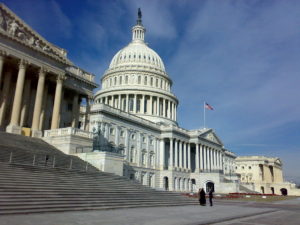 As the nation’s leaders debate the proposed federal legislation known as The Tax Cuts and Jobs Act, colleges and universities across the country are responding to a number of provisions that would have a significant impact on institutions of higher education.
As the nation’s leaders debate the proposed federal legislation known as The Tax Cuts and Jobs Act, colleges and universities across the country are responding to a number of provisions that would have a significant impact on institutions of higher education.
Among the leaders expressing their concern is Mark S. Wrighton, chancellor of Washington University in St. Louis, who has written on behalf of the university to the 15 members of U.S. Congress representing Missouri and neighboring Illinois to urge them to work against several sections of the bill that would have a negative impact on students and their families, as well as university employees.
In his letter to members of the U.S. House of Representatives, Wrighton indicated how troubled he is by significant portions of the proposed legislation, particularly those concerning the repeals of the Lifetime Learning Credit, student loan interest deduction, qualified tuition reduction and employer-provided educational assistance program. He also noted his alarm at provisions that make tuition waivers a taxable benefit.
“These policies have helped students obtain their college degrees and encouraged employers to help employees gain skills to advance their careers,” Wrighton wrote. “They have enabled graduate students to earn PhDs and then go on to make tremendous contributions to our economy, public health, national security and our fundamental understanding of the world. A Jobs Act should not erect additional barriers to higher education.”

Wrighton also expressed his concern about the impact the proposed legislation would have on charitable giving and the utilization of tax-exempt bonds by nonprofit organizations such as universities. He also criticized the legislation’s endowment excise tax proposal, pointing out that private college endowments are fundamentally different from private foundations in their purpose, motivation and organization.
“The role of endowed funds in the sustained operation of a university has long been misunderstood,” Wrighton wrote, “but properly managed endowment returns help Washington University to fund student financial aid, libraries, dormitories, student services and research while providing the means to weather economic downturns.”
In his letter to members of the U.S. Senate, Wrighton echoed several of the above concerns — particularly with regard to the excise tax on endowments — but also expressed appreciation that the Senate bill retains many benefits that would be eliminated under the House bill, such as graduate student tuition remission, student loan interest deduction and employer-provided educational assistance.
In addition to the letters, Wrighton also reached out directly to a number of elected officials to more personally share his perspective.